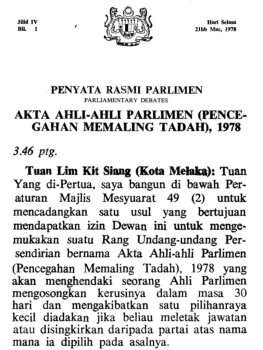 So you pay your assessment and quit rent (cukai pintu, cukai tanah). But do you have a say in how the money is spent by your local council? Right now, you can’t even elect your local councilors. The introduction of the Local Government Act 1976 brought to an end the ‘third vote’, a simple right that even China practices.
So you pay your assessment and quit rent (cukai pintu, cukai tanah). But do you have a say in how the money is spent by your local council? Right now, you can’t even elect your local councilors. The introduction of the Local Government Act 1976 brought to an end the ‘third vote’, a simple right that even China practices.
For 13 years, Malaysian local government elections were a vibrant and open practice of the democratic system. The Socialist Front and PPP (then opposition parties) benefitted from it and quickly gained control in areas such as the Kinta Valley and Ipoh.
However, after the Indonesian Confrontation, local council elections were suspended, said to prevent the opposition from making further inroads. More than three decades later, the third vote has never been restored.
Pakatan Rakyat governments in Selangor and Perak have attempted to restore this right to the people, but faced legal tussles due to interpretations of constitutional provisions and opposition from the Federal Government. After a legal battle, the Election Commission still refuses to implement local council elections.
For now, we are in a peculiar situation where Members of Parliament and the State Assemblies are elected, but local councilors are appointed.
Local governments, through local councilors, form the closest layer of engagement with the people. Entrusted with a more micro, yet defined radius of authority, the councilors are the ‘frontliners’ to deal with the demands and needs of the people in their area of jurisdiction. Ironically, most people don’t even know who their councilors are, let alone have a say in administration.
Increasing awareness campaigns by NGOs and political parties have hit a spot – more ratepayers now want a say. According to a 2010 survey conducted by Merdeka Centre, 70 per cent of respondents would support the return of the third vote, while only 16 per cent rejected the concept.
Why we need the third vote (Coalition for Good Governance)
1. Representation and democracy
Malaysians are being denied their right to choose their representatives for local issues. That power is now given to the State, ignoring the fundamental principle of “no taxation without representation”. Instead of the state choosing councilors it thinks is best, ratepayers should get a say. In this way, councils will be independent from the state and federal governments.
2. Merit and competence
Under the appointment system, councilor’s political affiliations are more important than their competency. Choosing councilors based on their know-who instead of their know-how spells doom for residents and leads to often dismal performance. The Highland Towers tragedy is a stark example of this, when the Ampang Municipal Council approved the hillside construction wantonly, at the expense of lives.
3. Accountability and transparency
If councilors are not elected, they are not accountable to the rakyat for the money that they spend. There are 144 local councils in Malaysia with a combined expenditure of over RM13 billion. They are not obliged to reveal their accounts or seek approval for their budget. The lack of transparency can lead to absurd spending such as the RM500,000 that DBKL spend on self-cleaning public toilets.
- Adapted from ‘Bring Back Local Government Elections’ An advocacy paper by the Coalition for Good Governance.
Their Hands are Tied
By Lim Kit Siang
One of the reasons why local councils nationwide are not living up to the expectations of the people is that they are limited by all sorts of financial constraints and administrative rulings set by the Federal Government such as the Ministry of Finance and so on.
Most of the major functions of local councils are heavily dictated and influenced by the Federal Government. These functions include local councils’ procurement processes, solid waste management contracts, the implementation of Certificate of Completion and Compliance which has taken away the role of local councils in granting Certificate of Fitness for Occupation, etc. On top of that, most senior positions in local councils are filled by candidates from the Civil Service Department.
There is also a ruling that restricts local councils in terms of the selection of contractors. For example, small projects are only open to Class F contractors and Alam Flora’s agreement with local councils is restricted to Bumiputera contractors only.
Local councils no longer handle sewerage discharge and treatment as it has been placed under Indah Water Konsortium (IWK), a national sewerage company, wholly-owned by the Minister of Finance Incorporated. Furthermore, the construction of schools and other building structures that are funded by the Federal Government do not require planning approval from local authorities.
The Federal Government should return sovereignty to local councils and the state government, including the right to select their own officers without interference from the Federal Government’s Civil Service Department.
It is the local councils and the state governments that understand the needs and requirements of the local community much better than the Federal Government. The Federal Government ideally should only have the right to enact laws and parliamentary bills, to provide legal uniformity in running municipalities. Even in those areas, the Federal Government cannot function alone without proper consultation with the various state and local authorities. -The Rocket




